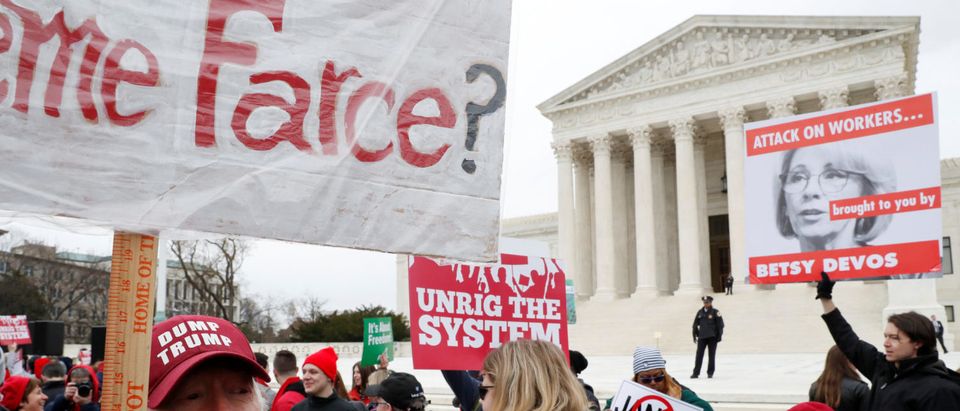Blockbuster rulings in cases involving President Donald Trump’s travel ban and mandatory union dues are expected this week, as the Supreme Court convenes for its final decision days before the summer recess.
The justices may have positioned the Court for a climactic conclusion after the tribunal opted for narrow holdings in landmark cases concerning partisan gerrymandering and the rights of religious dissenters.
There are six cases still outstanding from the high court.
The union dues case, Janus v. AFSCME, is the latest challenge to a 1977 precedent called Abood v. Detroit Board of Education, which allows public sector unions to collect fees from non-members to cover administrative costs incurred through collective bargaining. These so-called agency fees protect union shops from the “free-rider” problem, in which non-unionized workers reap the benefits of membership — like higher wages and benefits — without enrolling in a union.
Abood also provides that agency fees may only be used for expenses relating to contracts or negotiations which benefit all public workers. They may not be used for political activities.
Critics of Abood say the distinction between political and non-political expenditures is meaningless, since all public union activity is political, especially in the context of collective bargaining. Therefore, they argue agency fees require government workers to subsidize speech with which they may disagree, in violation of the First Amendment. (RELATED: Roberts Joins Liberals To Issue Sweeping Privacy Victory)
The Supreme Court seemed poised to overturn Abood in a 2016 case called Friedrichs v. California Teachers Association, but Justice Antonin Scalia’s death left a short-handed Court unable to resolve the dispute. The Court took the Janus case shortly after Justice Neil Gorsuch’s confirmation in 2017.
The justices will also decide the legality of Trump’s latest travel sanctions. A coalition of Democratic states and civil rights groups argue that the ban exceeds the president’s authority under the Immigration and Nationality Act and the First Amendment, alleging its real purpose is to disparage Islam.
The current ban is imposed to varying degrees against nationals from Iran, Libya, North Korea, Somalia, Syria, Venezuela and Yemen.
As a general matter, each justice will write one majority opinion for each sitting of the Court. A sitting refers to a two-week period in a given month during which the Court hears oral arguments. The travel ban case was argued in April, and the only two justices who have not written a decision from that sitting are Chief Justice John Roberts and Justice Samuel Alito, potentially a promising sign for the administration.
Other pending decisions include NIFLA v. Becerra, a challenge to a California law requiring crisis pregnancy centers to provide information about state-funded abortions, and Florida v. Georgia, a dispute over the apportionment of water from the Apalachicola-Chattahoochee-Flint River Basin.
Send tips to kevin@dailycallernewsfoundation.org.
All content created by the Daily Caller News Foundation, an independent and nonpartisan newswire service, is available without charge to any legitimate news publisher that can provide a large audience. All republished articles must include our logo, our reporter’s byline and their DCNF affiliation. For any questions about our guidelines or partnering with us, please contact licensing@dailycallernewsfoundation.org.


